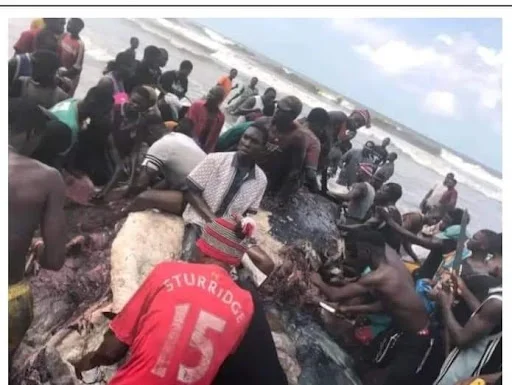Bayelsa-Residents-Butcher-Beached-Whale-in-Brass-Island
Bayelsa Residents Butcher Beached Whale in Brass Island
In the Okpoama community of the Brass Local Government Area in Bayelsa State, residents recently butchered a beached whale that washed ashore. The whale, a colossal specimen measuring approximately 15 meters in length, five meters in width, and standing about three meters high, was found deceased on the beach early Wednesday morning.
Discovery of the Whale
The whale's arrival is believed to have coincided with the high tide on Tuesday night. As the tide receded, the massive marine mammal was left stranded on the shore, attracting the attention of local residents. By dawn, word had spread throughout the community about the presence of the giant sea creature.
Community Response
Upon discovering the whale, the people of Okpoama quickly mobilized to butcher the animal. A local source, Tarinyo Akono, reported to The PUNCH that community members were using a variety of tools, including machetes, hacksaws, and axes, to dismantle the whale. The sight of villagers working tirelessly to cut the whale into pieces was a clear indication of the communal effort involved in the task.
Historical Context and Significance
This event is not unprecedented in the region. The occurrence of whales washing ashore has been documented in various coastal communities around the world. In Bayelsa State, such incidents have historical and cultural significance. Whales, when they beach themselves, often become a source of valuable resources for local communities. The meat, bones, and other parts of the whale can be utilized in numerous ways, providing a substantial, albeit temporary, boon to the community.
Legal and Environmental Considerations
While the butchering of beached whales can be seen as a pragmatic response to an unexpected resource, it also raises legal and environmental questions. Internationally, many countries have regulations and protections in place concerning marine life, including whales. The handling of a beached whale often involves environmental agencies to ensure that the process adheres to conservation laws and to mitigate any potential health risks to the public.
In Nigeria, the framework for such occurrences might not be as robust, leading communities to rely on traditional practices. This event highlights the need for a clear policy and procedural guidelines to manage such incidents. Proper management can ensure that the ecological impact is minimized and that public health is safeguarded.
Ecological Impact
The beaching of a whale can have several ecological implications. Whales play a significant role in marine ecosystems. As apex predators and as part of the ocean's nutrient cycle, their presence affects a wide range of marine life. The death and subsequent butchering of a whale can disrupt this balance, albeit locally. Additionally, the decomposition of whale carcasses, if not managed properly, can lead to environmental hazards, including water contamination and foul odors.
Community Benefits and Risks
For the Okpoama community, the immediate benefit of the whale is the large quantity of meat and other usable parts it provides. In areas where food security can be an issue, such a windfall is significant. However, the risks involved cannot be overlooked. Consuming meat from a whale that died of unknown causes poses health risks, as toxins or diseases could be present. Furthermore, the process of butchering and distributing the meat requires careful handling to prevent spoilage and contamination.
Recommendations for Future Incidents
To better manage similar incidents in the future, a set of recommendations can be proposed:
Establishment of Protocols: Government agencies should develop and disseminate protocols for handling beached marine mammals. These protocols should include steps for proper documentation, health and safety measures, and guidelines for the ethical use of the animal's remains.
Community Training: Local communities, especially those in coastal areas, should be trained on these protocols. This training should cover aspects such as the identification of potential health risks, safe butchering practices, and environmental conservation principles.
Collaboration with Environmental Agencies: There should be a clear line of communication between local communities and environmental agencies. In the event of a beached whale, quick coordination can ensure that the incident is managed in a manner that is safe, legal, and environmentally responsible.
Public Health Measures: Health departments should monitor and provide guidance on the consumption of whale meat. Testing for toxins or diseases should be conducted, and the public should be informed about the safety of consuming the meat.
Environmental Conservation Education: Increasing awareness about the importance of marine life and the ecological role of whales can foster a greater sense of stewardship in coastal communities. Education programs can highlight the broader impact of human actions on marine ecosystems.
Conclusion
The recent butchering of a beached whale by the Okpoama community in Bayelsa State underscores the complex interplay between traditional practices, community needs, and environmental considerations. While the immediate benefits to the community are evident, there is a clear need for structured management and guidelines to handle such events in the future. By implementing protocols, providing education, and fostering collaboration, the balance between utilizing resources and preserving ecological integrity can be achieved






Comments